UNDP supports NIC to review for effective implementation the Agric insurance policy in Ghana
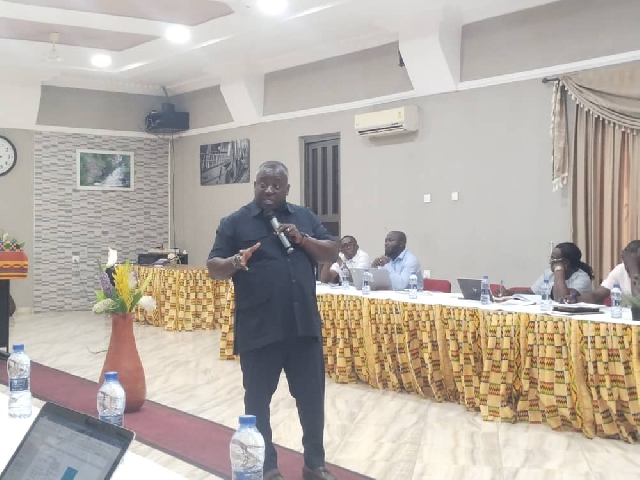 Mr. Michael Abbiw addressing partiipants
Mr. Michael Abbiw addressing partiipants
The National Insurance Commission with support from the United Nations Development Programme's Insurance and Risk Finance Facility has sanctioned MGA Consulting, as the lead consultant for the review of the Agricultural Insurance Policy Framework in collaboration with the Ghana Insurers Association so as to see to how best to adopt the Ghana Agricultural Insurance Pool (GAIP) model to scale up inclusive insurance uptake in Ghana.
The consulting firm after consultations with relevant stakeholders has recommended practical steps to be taken within the current legislative position to support the progressive implementation of Agricultural (Agric) insurance in Ghana led by industry to ensure sustainability whilst NIC looks for ways in the legislation to support industry to come up with innovative products for the benefit of especially farmers and the agriculture supply chain.
The call was made during a workshop on Legal and Regulatory Review and Capacity Building held in the Eastern Region.
The workshop aimed to identify gaps and opportunities in developing an inclusive insurance regulatory strategy and roadmaps to shape the future of not only agricultural insurance but the broader subject of inclusive insurance in Ghana.
Mr. Michael Abbiw of MGA Consulting emphasized the need for legislation to establish Agric insurance as a standalone entity.
He highlighted that effective implementation of Agric insurance requires significant interventions from all stakeholders even as he reminded the NIC to take a special look at Agricultural insurance which could serve as the catalyst to parachuting the insurance penetration rate to astronomical levels after the National Health Insurance Scheme in Ghana.
Mr. Abbiw proposed the creation of a consortium model for Agric insurance such as the GAIP model but this time being spearheaded by the insurance industry instead of government to ensure sustainability.
That NIC could involve the government and donor partners, to address affordability issues among others.
The proposed model he emphasised could avoid subsidizing premiums directly to farmers, thereby making insurance accessible to smallholder farmers.
He urged the NIC to convene a stakeholder engagement to demonstrate the entire value chain and how each player can contribute to the success of Agric insurance.
Mr. Abbiw also suggested involving stakeholders from countries with successful Agricultural insurance models, such as the Philippines, Kenya, and Bangladesh, in these engagements.
This he said would provide valuable insights and lessons for Ghana’s implementation process.
On his part, the Commissioner of the NIC, Mr. Michael Kofi Andoh, expressed caution about establishing a standalone Agric insurance entity.
He pointed out that focusing solely on Agric insurance, which is inherently catastrophic, instead of inclusive insurance in general could lead to many unforeseen complications that could erode all efforts made gradually but progressively being made to ensure inclusive insurance plays a crucial role in the Ghanaian insurance landscape.
Mr. Andoh also highlighted the challenges posed by climate change in Agric insurance financing, stressing the need for a balanced approach if sustainability is what we desire as a country.
On her part, the UNDP's IRFF representative Dr. Amina Sammo expressed her greatest appreciation to especially the Commissioner of Insurance Mr. Kofi Andoh for his unflinching support and commitment to the IRFF project in Ghana, the management and staff of the National Insurance Commission, industry and all stakeholders present for their commitment to ensuring that the unserved and the underserved population of Ghana are adequately catered for with one form of insurance cover or another to increase their resilience to emerging risks such as floods, fire, accidents, etc.
She further stressed the need for all stakeholders at the workshop to have open minds to really come up with workable recommendations and implementation strategies to make the work of NIC easier and readily implementable.
She asked all participants present who were experts in their various fields that serve the various aspects of the insurance industry to remain focused and committed to the reason for the gathering and be ready to learn, unlearn and relearn over the next few days for the benefit of the insurance industry and the general Ghanaian populace at large.
She concluded by saying that the UNDP as a development partner is ever ready to support any good initiative that contributes towards the achievement of the sustainable development goals.
The workshop underscored the importance of regulatory collaboration to advance inclusive insurance in the country.
Both MGA Consulting and the NIC emphasized that a comprehensive and inclusive insurance strategy is vital for enhancing the resilience and sustainability of Ghana’s agricultural sector and that with continued support from the government, industry and development partners such as the UNDP's IRFF, a lot more could be done in terms of reach, innovative product development, progressive onboarding of the unserved and underserved populations could easily become a reality.
Participants at the workshop discussed various strategies and gave recommendations to the consultant to incorporate in the final work for ease of reference and implementation.
All partners present expressed the desire to work collectively to achieve the workshop and capacity development goals of the program over the next few days.
Source: Classfmonline.com/Cecil Mensah
Trending Business

Apostle Samuel Oduro calls for support to scale up local Apple production
21:04
GRA announces major VAT reforms under new Value Added Tax Act
03:44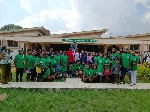
Ketu North MP launches skill and apprenticeship programme for 207 youth
01:22
NPA reaffirms commitment to energy safety and sustainability
02:46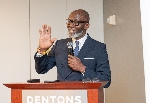
‘Make Africa borderless now!’ campaign to be launched in Accra
01:08
AngloGold Ashanti's Obuasi Mine and Ashanti Green Initiative launch new chapter in community empowerment
19:26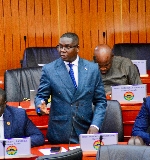
Dr Gideon Boako hints at new GoldBod losses in Bank of Ghana audited accounts
11:13
KGL striving as Fourth Estate continue chasing non-existent glory
08:26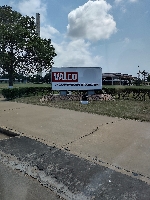
VALCO targets full revival of two potlines by 2027 as smelter recovery gains momentum
01:53
MoFA begins poultry distribution in Ashanti Region under 'Nkoko Nketenkete' initiative
18:50




